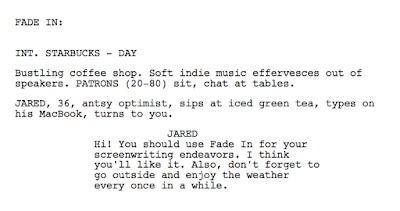 |
| Heavy meta. |
Fast-forward to grad school. I had heard of Final Draft (FD) but wondered if it was really that much better. It was. I was astounded to find software that worked as fast as I thought. It seemed to know the element I wanted before I did, myself. Creepily fantastic, I threw myself into script after script with trusty Final Draft by my side. Together, we could tackle anything.
Anything, save for Final Draft 8's own propensity for crashes in El Capitan.
I ran FD8 on a Mac with El Capitan, which Final Draft's own website states is just fine (Mac OS X v10.4.11 or later). I'm an obsessive document saver, frequently saving my document at least three times a minute. This issue began shortly after upgrading to OS X 10.11. It would happen like this: I'd write some dialogue or an action/description block, then hit save. No problem. I'd repeat the process, hit save, and Final Draft would crash. I'd head back into the document, and nothing had been saved from my last successful, non-crashy save. This is a problem, as I prefer it when my work is saved. This occurred every dozen or so saves.
Like the very protagonists about whom I wrote, Final Draft was doomed by a flaw from within.
I contacted Final Draft tech support with the full Apple-generated crash report. Final Draft's advice was to upgrade to FD9 for $99. I didn't think it was fair to pay for new software when the older software is marketed to play well with my current operating system. So I went on the hunt for alternatives.
And that brought me to Fade In.
Programmed by Kent Tessman, Fade In is spectacular. It imports from Final Draft, Fountain, Scrivener, Adobe Story, and Celtx. By default, it exports in its own proprietary format but it can be exported as a PDF, EPUB, or as a Final Draft file. If you're familiar with Final Draft's interface, then there's little to no learning curve to Fade In. It's minimalist, intuitive, and easy to use.
Best of all? I just completed a feature script with it and it crashed precisely zero times. It's cheaper than Final Draft ($49.95), more reliable, and packs in some amazing features that even Final Draft lacks, such as the amazing Dialogue Tuner, which isolates a character's full dialogue from your script, enabling you to edit that character's dialogue all at once - a great feature for ensuring a consistent character voice and point of view.
Check out the Fade In feature list and feature comparisons against Final Draft. Writing is challenging enough and any software that can make it easier to climb over roadblocks deserves a place on your machine. Download a trial and give Fade In a spin. It'll make you feel like even more of a pro than you already are.
That said, there are hundreds of screenplay contests out there, and Final Draft runs a spectacular screenwriting competition that's among the nine or 10 I strongly endorse. Check it out!
I have not been paid or otherwise gifted to endorse Fade In. I'm just a fan and I think that everyone ought to know about it.
*
In one of my recent Emerson screenwriting classes, we had a discussion about writing a relatable protagonist. How do you hook an audience with your character within the first five to 10 minutes of a feature? Or the first page, if you're writing a short?
While this is a question with multiple insightful answers (none of which are bite-sized), I'd posit that a question (among many) you ought to ask is: how has my character suffered? What has wounded them? Better yet, show us the wound as it occurs! Like an injured baby bird, we'll be drawn to your character and cheer for them to rise. By virtue of being who he or she is, what causes him or her to be the recipient of gross injustice? We want to see wrongs righted. Give us what we want!
Write on.
*
Jared teaches screenwriting at Emerson College and Salem State University. His creative work has appeared on MTV Networks, in the Tribeca Film Festival, and the Austin Film Festival. He offers screenplay coverage at www.screenplay.guru.
No comments:
Post a Comment